 Petzlover
PetzloverAmerican Molossus is originated from United States but Kangal Dog is originated from Turkey. American Molossus may grow 19 cm / 7 inches shorter than Kangal Dog. American Molossus may weigh 15 kg / 33 pounds lesser than Kangal Dog. Both American Molossus and Kangal Dog has almost same life span. Both American Molossus and Kangal Dog has almost same litter size. Both American Molossus and Kangal Dog requires Moderate Maintenance.
Based on the massive dog of Mesopotamia in 5000 BC, the American Molossus is the same dog recreated in the United States by and for the lovers of these giant dogs. The ancient Molossus was fierce to look at, massive in size, courageous and loyal. He was undaunted by any animal and stood up to any man attempting to hurt his master. When Rome fell the descendants of today’s Molossus were scattered and attempts to revive the breed have created carious large dogs. The American Molossus is the first true recreation that hits the mark.
The original Molossus was one of the most primitive of dogs, one of the earliest dogs that men domesticated. Their initials duties were the guarding of herds and homes against all enemies. They were incredibly loyal to their one master and stayed with him and protected him. These dogs also ate carrion and served the villages by eliminating animal carcasses. They could handle any other hunting animals such as wolves and large cats. This dog, although extinct was the ancestor of all the Mastiff-type dogs of today. The Molossus is said to be the ancestor of the St. Bernard, English Mastiff, Greater Swiss Mountain Dog, Bernese Mountain Dog, Newfoundland, Great Dane, Great Pyrenees, Rottweiler, Rottweiler and the Neapolitan Mastiff. Now these breeds have become the ancestry of the American Molossus.
According to Marcus Curtis, the founder of the new Molossus, the nearest relative of the American Molossus is the Neapolitan Mastiff. The Hines Bulldog, German Rottweiler, American Bandogge, and South African Boerboel together with the Neapolitan Mastiff were used to form the American Molossus. The goal of the founder was to make a great family pet and protector. It was specifically bred to be courageous, loyal and protective.
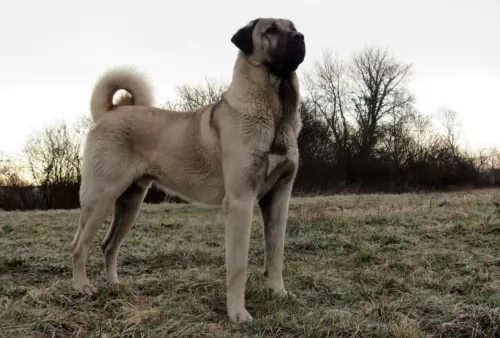 The magnificent looking Kangal Shepherd Dog, a purebred Mastiff type dog, is often referred to as a sheep dog and hails from the Sivas province of Turkey.
The magnificent looking Kangal Shepherd Dog, a purebred Mastiff type dog, is often referred to as a sheep dog and hails from the Sivas province of Turkey.
The Kangal Dog is a distinct breed and the National Dog of Turkey. These are working dogs who made their appearance in the UK in 1965.
It is interesting to note that in June 2018 the Turkish Kennel Club, Köpek Irklari ve Kinoloji Federasyonu, classifies Kangal Shepherd Dogs to be the same population as the Anatolian Shepherd dog.
This is a giant, massive dog in every way and this recently developed standard makes that very clear. The Molossus should be heavy bones, muscular with a lot of loose skin and wrinkles of all kinds, everywhere. He is an intimidating presence, with a massive square head, broad shoulders, height and mass. No, the American Molossus is not athletic, but he certainly is intimidating.
His head is massive in comparison to his body and it must be square. He has extensive wrinkles and pendulous lips and dewlap. The face is all folds of skin and wrinkles. Deep set eyes, drooping upper lids and lower lids as well as an intimidating expression. His brow is well developed with a marked frontal furrow. The nose is large, and the muzzle is about a third of the length of its head. It is short and broad. Everything about the head must be square. It’s neck and body are powerful and muscular. The chest is deep, wide and barrel like. The back is also powerful and muscular. The front legs are heavy and muscular while the hind legs are broad, strong, powerful and wide-stance. Do not remove the front dew claws. His tail is thick and wide then gradually tapers at the tip.
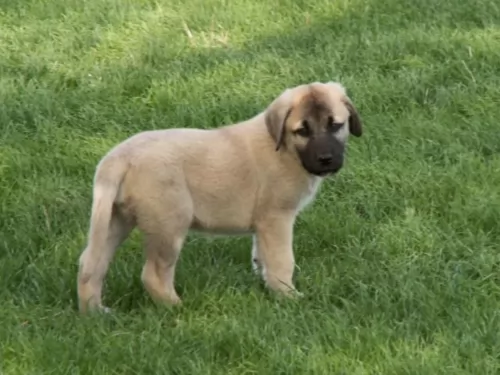 This is a large, heavily boned dog with a big head with a black mask and medium sized floppy ears. Looking at him, he has a Mastiff-like appearance but isn't as heavy as some Mastiff breeds, allowing it more speed and agility.
This is a large, heavily boned dog with a big head with a black mask and medium sized floppy ears. Looking at him, he has a Mastiff-like appearance but isn't as heavy as some Mastiff breeds, allowing it more speed and agility.
He stands at roughly 72cm to 85cm male and female, and weighs about 50 to 63kg. He has a solid double coat of dense hair which is a pale tan color.The coat is short and dense. The Kangal Dog is powerful and when he is alert, the long tail is held over the back, otherwise he holds it down with a slight curl.
The Kangal is known for his good looks, but he is also alert, sharp, territorial and confident, while also being calm. These dogs have an instinctive wariness of strange dogs and they are also reserved with strangers but are loving, loyal and protective with their human family.
In fact, the Kangal Shepherd Dog is protective while being gentle with small children and animals. He is an intelligent breed too, and having him trained and socialized won’t be a problem.
It is always a wise move to have a big dog like this trained and socialized, making him obedient and even more amicable than he already is.
The American Molossus is an intimidating massive giant bred for protection and guard duty. He is incredibly loyal to his family and courageous in his protection of them. They are guard dogs, not attack dogs. Their simple appearance is usually enough to frighten off anyone intending harm on their families. He is in reality a loving giant. He is intelligent and stable with a strong desire to please his owner. He is a calm yet vigilant presence in the home.
Because the Molossus is so large, it is recommended that the puppy be socialized and trained professionally. It takes a strong owner to handle this breed. They need to know the rules and have the rules consistently applied. The owner must be the pack leader.
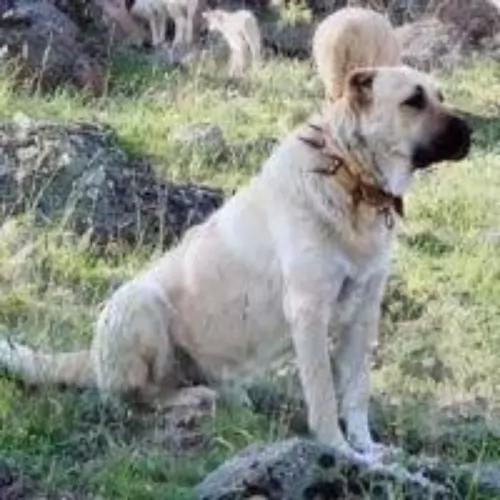 Your Kangal Dog is a big, powerful dog. His very size size won't suit him living in the city in small spaces and tiny gardens. He is far better suited to life in the suburbs or to country life where he can move around easily.
Your Kangal Dog is a big, powerful dog. His very size size won't suit him living in the city in small spaces and tiny gardens. He is far better suited to life in the suburbs or to country life where he can move around easily.
In spite of his size, he is a calm, balanced, independent, protective dog. He may well be aloof towards strangers, but a trained and well-socialized Kangal Dog is friendly, loving and loyal pet with his human family and with visitors to the house.
This is a beautiful dog and it will be an honor to have such a wonderful pet in your home. Treat him well and you're bound to have the most fantastic protector, guardian and friend.
Like all Mastiffs the American Molossus faces a variety of potential illnesses, some brought on by its size, some not.
This could easily be a function of its massive size. It is a degenerative disease and can cause the dog to become lame. In many cases the vertebrae can fuse, or severe pain can result. This is mostly seen in older members of the breed.
Male Molossus can contract this inherited metabolic disease primarily. It can be life threatening and very serious as it affects the kidney and the bladder.
This is essentially Cervical Vertebral Instability (CVI) and is caused by the pressure of the nerves in the neck and cervical spinal cord. This compression can cause deformity, pain and abnormal stance/gait. IT has been attributed to the nutrition needs and rapid growth of the Mastiff breeds.
Like all giant Mastiff breeds the Molossus can have skin issues from the wrinkles, dysplasia in the joints which we will address below.
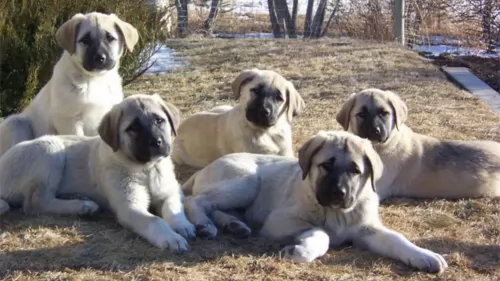 This is most important if you don't intend your Kangal Dog becoming a parent, and is good for the health of your dog.
This is most important if you don't intend your Kangal Dog becoming a parent, and is good for the health of your dog.
Your Kangal Dog puppy needs certain vaccinations at certain stages of his life to prevent him from getting some life threatening dog diseases. Keep a check on your dog's health and realize, that although the Kangal Dog is a healthy dog breed, he can develop canine illnesses such as eye diseases, ear infections, bloat, skin allergies and hip dysplasia among others.
Your dog may then require veterinary intervention to heal him of any of these.
To keep your pet happy and healthy, make sure to pick up your dog's faeces every day. This is for your own health's sake too.
Remembering that this is a very, very large dog you need to be careful about nutrition and how fast your puppy will grow. American Molossus puppies need four meals a day until 12 weeks old. Then until they are 6 months old feed then 3 times a day. Finally, from 6-month-old puppy to adult – feed them twice in 24 hours.
At one year either feed them once or two small meals.
Many people feed their Molossus eggs, vegetables, fruit, and cottage cheese as ten 5 of the total for the day but avoid other table foods. The Molossus can become very picky about what he eats if you feed him too many table scraps.
In addition to the health problems listed above, the American Molossus is also susceptible to: Ditichiasis – Eyelashes that are in the margin of the eyelids and can cause eye irritation. May require surgery to correct.
Could cause blindness if not removed. Ectropian/Entropion: Eversion and inversion of eyelids which cause ocular irritation.
This is a degenerative disease which causes the dog to go blind. It is a disease the affects the retinal visual cells, first causing night blindness then day blindness. A DNA test is available for detecting PRA in all Mastiff breeds.
Common in large breeds and especially in giant breeds like the Molossus. Multiple forms and causes but all can cause pain and lameness.
Do to wrinkles and loose skin – check often for moisture and infections.
The is a problem based on a variety of possible causes. It happens when the puppy is between 6-16 months of age. Lameness occurs over time in one limb or in all. It can be intermittent and might be caused by diet, genetics, stress, autoimmune or metabolic issues or infection.
This issue is developmental as the dog’s toes turn either inward or outward, then as the condition advances the dog suffers fever, pain in all joints, lethargy and the inability to stand. This happens when the dog consumes too many calories for his activity level in the development times.
The American Molossus is not a couch potato. He needs to be walked at least twice a day and loves to play fetch. He will be greatly benefited by obedience training. Do not overdo it with exercise but make sure they don’t just lay around.
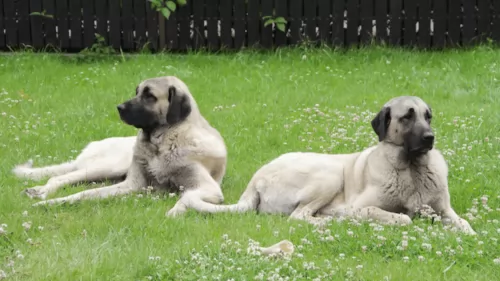 The Kangal Dog can be a wonderful pet in your home, but because you’ve made the decision to bring him into your home, it becomes your responsibility to ensure his happiness and wellbeing.
The Kangal Dog can be a wonderful pet in your home, but because you’ve made the decision to bring him into your home, it becomes your responsibility to ensure his happiness and wellbeing.
These ‘care’ tips can help you, particularly if you’re a first time dog owner -
Remember that a puppy will need 4 meals a day of soft, recommended puppy food. By the time your dog reaches his first birthday, one or two meals a day will be good.
There are some top quality commercial manufactured foods to choose from, and the packaging labeling will guide you to which one.
Adding in some home-made food such as nutritious cooked chicken, rice and vegetables will be a treat for your pet and don’t forget some raw meat occasionally too.
Fresh, cool water should be within reach of your pet around the clock.
Dogs need exercise to maintain their lean bodies but it will also stimulate their minds and keep them healthy. The exercise needs of your dog will depend on his size, age, health and breed type. Fun and games as well as daily walks will satisfy your Kangal Dog and keep him content.
Help keep your Kangal Dog looking groomed and cared for. He is a fairly heavy, seasonal shedder. Remove loose hairs with brushing the coat twice a week. Check for fleas and ticks at the same time and for any unusual lumps.
Every dog needs a warm, dry, quiet place to rest and sleep, inside and outside. Make sure that when your dog is outside that he has a place to rest in the shade and sun, as he chooses.